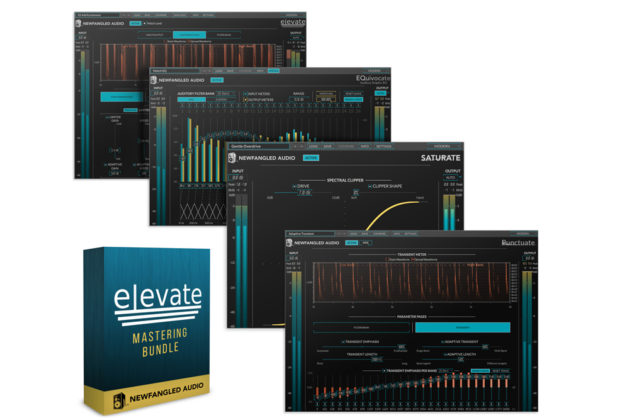Newfangled Audio's Elevate is an all-in-one multiband mastering plug-in that has a multiband limiter, human-ear EQ and powerful audio maximizer to increase loudness or improve its dynamic perception. In using it myself, I found its intelligent adaptive technology did most of the tweaky guess work in real-time for creating the best sounding master.
Dan Gillespie started Newfangled Audio; he wrote DSP code for Eventide for 15 years. Elevate uses traditional DSP coupled with some basic machine learning.
The Elevate mastering plug-in is comprised of four sub-modules. They are a Filter Bank, Multiband Limiter/EQ, Transient section, and Spectral Clipper. The Elevate Bundle includes separate plug-ins: EQuivocate Graphic EQ, Punctuate Adaptive Transient Processor, and Saturate Spectral Clipper plug-ins. The plug-ins each has enhanced features over the versions within Elevate.
The EQuivocate plug-in is similar to the EQ section in Elevate but adds a Range parameter and Match EQ functionality. The Punctuate plug-in adds Length and Adaptive Length controls to the Transient section in Elevate. It also adds transient suppression, while Elevate does transient emphasis only.
These sub-modules work the same as their separate plug-in versions so you would not have to re-learn them if you make Elevate your "one-stop" mastering processor. I found the separate plug-ins very useful for specific problem solving on individual tracks in my mix work.
Like Eventide's tradition of supplying many well-made presets, Elevate doesn't disappoint here either and comes with presets by APS Mastering, Matt Lange, Jeremy Lubsey, Eric Beam, ROCAsound, Chris Tabron and John McCaig.
For mastering, I found myself mostly in the Filter Bank section of Elevate where each band automatically adapts the attack, release and look-ahead parameters so as to greatly reduce the negative artifacts and distortion usually encountered with deep compression.
I preferred using three to six frequency bands but you can have up to 26 bands whose center frequencies are spaced on the Mel scale or your own custom scale. The Mel scale is a perceptual scale of pitches judged by listeners to be equal in distance from one another. It is said that to alter audio using these frequency centers sounds more natural to the human ear. I liked soloing any of the bands to hear exactly what was happening to the sound at that frequency.
Moving over to the Transient section, you can elect to keep the same or boost fast transients so that your mix will sound less squash. I started using Transient processor by boosting the critical frequency bands that contain the transient's power--you can see their peaks on the display. I went for the percussive edges of snares, kicks, and vocal consonants. Those sources now sounded clear--not muddy even though I heavily squashed them!
I'm not much on using clippers on entire mixes but the Spectral Clipper will overdrive the final output without altering the overall musicality too much---so no more loss of low frequencies or ending up with a honky-sounding and boxy mid-range.
There is a learning curve involved with the Elevate Bundle 1.5 but like all the Eventide products, you will be rewarded with greater finesse and control over the finished sound of your mixes and/or individual tracks! Highly recommended!
The Elevate Bundle 1.5 sells for $199 and you can buy the awesome EQuivocate by itself for $99 MSRP.
Barry Rudolph is a recording engineer/mixer who has worked on over 30 gold and platinum records. He has recorded and/or mixed Lynyrd Skynyrd, Hall & Oates, Pat Benatar, Rod Stewart, the Corrs and more. Barry has his own futuristic music mixing facility and loves teaching audio engineering at Musician’s Institute, Hollywood, CA. He is a lifetime Grammy-voting member of NARAS and a contributing editor for Mix Magazine. barryrudolph.com














